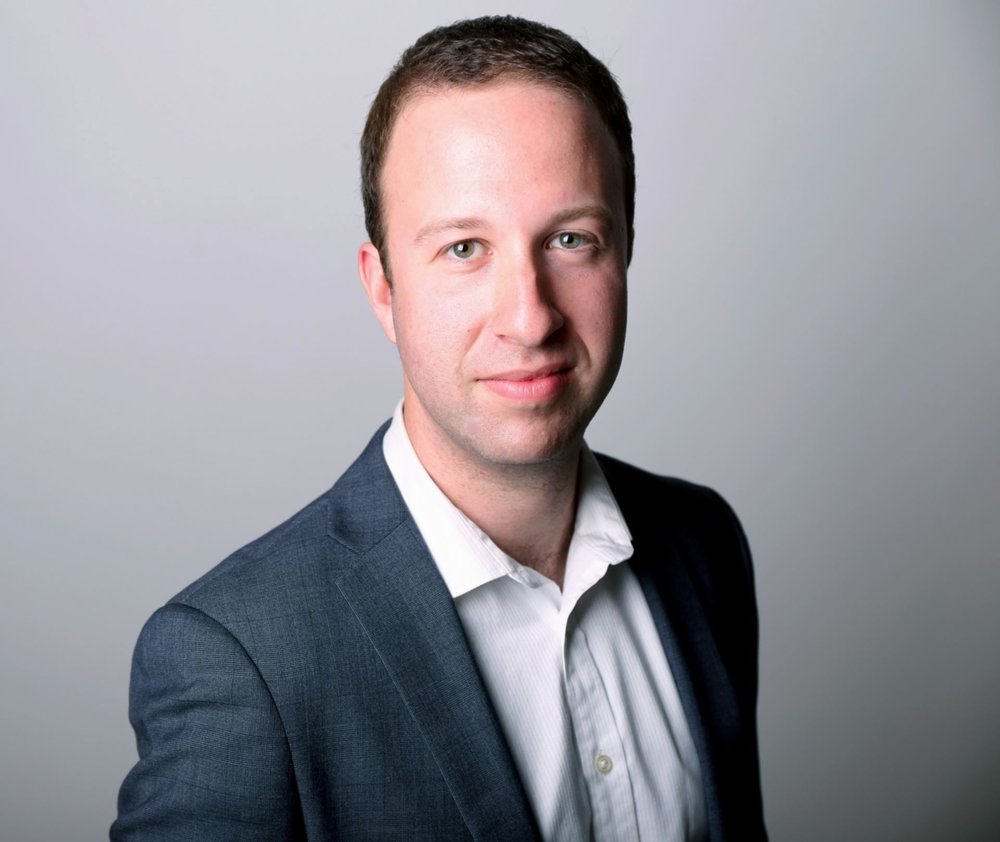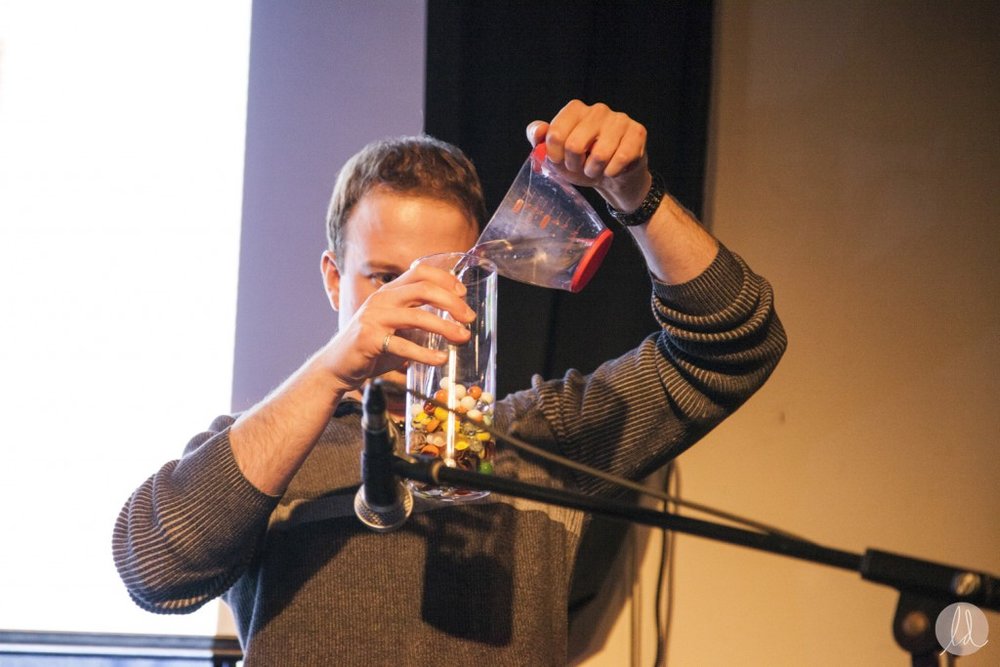The ability to communicate research and data to non-specialist audiences is key in influencing future changes, which is why it’s vital to help students learn the science of communication now.
We interviewed science communicator, environmental professional and entrepreneur Alan Shapiro (@watercomm), to learn more about effective science communication. Along with Nikki Berreth (@CommWinds), Alan co-founded LitScientist – a science communication training firm that supports academic, research, and technical organizations – and Science Slam Canada – a non-profit organisation that runs science outreach events across the country.

Every scientist needs to look at science as not just a research exercise, but also as a communication exercise… Scientists have a responsibility to be a part of that ecosystem, even if they aren’t the communicators themselves.
Thanks for joining us Alan. Can you share with us what you do?
I do a couple of things. I’m an environmental professional – my background is in hydrogeology, with a mix of geoscience and policy and planning. I work primarily on water projects, and have moved towards sustainability and policy and planning over time. I also work in science communication (‘sci comm’). I started working in this field because I was so excited to share the work I do in the earth sciences. And as I ventured into sci comm, I noticed there were many gaps, which led to myself and Nikki co-founding LitScientist and Science Slam Canada.
What motivated you to start LitScientist and Science Slam Canada?
We knew there were many individuals who wanted science communication training, but there were few resources available. So that’s why we started LitScientist – we wanted to make sci comm training available and accessible to the groups that needed it. We also realised there were very few venues to practice. We wanted to create an opportunity to showcase good science communication, where the audience could also be involved and have fun, so we started Science Slam Canada.
Why is science communication important?
We need to get as much value as we can out of science and research. There’s this mentality that research ends with publication, but that’s a very flawed idea. Science needs to be rooted in society and impact. We need to think of how we can mobilise knowledge from research institutions and share it with those who can use it.
There is also an ongoing phenomenon of decreasing public trust in science. In Canada, surveys have shown over the last couple of decades that individuals are becoming more detached from scientific institutions. But paradoxically, understanding science is actually more important now than ever before. In our day-to-day lives we have so much data and technology available to us. We need to foster trust between non-specialists and researchers, so people know where to go for answers, and can sift through the misinformation they are bombarded with daily.
Do you think scientists and researchers have a responsibility to become better communicators?
There is a big discussion going on right now about what the role of scientists should be. Not every scientist needs to be a communicator, because that’s not everyone’s strength. But the way we view science needs to change. Every scientist needs to look at science as not just a research exercise, but also as a communication exercise. Those who have interests or abilities in science communication should pursue it themselves, and those who don’t need to find ways to share their research through other voices. Scientists have a responsibility to be a part of that ecosystem, even if they aren’t the communicators themselves.
Is science communication important for the geosciences?
Yes, because geoscience is special in two ways. First, it’s around us all the time. So it generates a lot more interest. For example, people are generally concerned and interested in water. So this can be a gateway science, to show people how cool research can be. The second part of the story is that since it’s around us all the time, there’s also a lot of misinformation.
How does science communication help us face global sustainability challenges?
A lot of these global challenges are so pressing today, and we need science communication to help translate research into action. We need everyone – governments, organisations, individual people – to understand and act on research.

What advice do you have for scientists who want to become better communicators?
Start by identifying your expert blind spot. You may know a lot about a particular topic, but along the way you’ve forgotten what it was like to not know or understand the subject. It’s a challenging and humbling process to realise that just because you’re the knowledge holder doesn’t immediately qualify you as a good communicator or educator.
To illustrate, a rocket scientist knows a lot about basic physics, but if you ask them to teach a Grade 8 class about physics that class will likely get very confused. The scientist may know the concepts well, but knowing the material and remembering what it was like to learn it for the first time are two very different things. A Grade 8 teacher would be in a much better position to share the content at a level that is appropriate for the students.
So that’s the first thing, you need to put yourself in the shoes of your audience. Try to remember what it’s like to not know your subject. Think about what’s important for them to know.
The second part is understanding your audience. Communication doesn’t end when you say something. It ends when the audience takes it away and interprets it. And sometimes audiences connect with your material in ways you never would’ve expected!
You need to analyse and understand your audience: their background, interests and priorities. Make sure what you’re sharing is relevant to them and is something they can act on.
Finally, find the story that’s relevant to your audience. A lot of the time, communication in technical settings is process-based. Here’s where I started, here’s what I did, and here’s what I found. But that process based communication isn’t relevant to most people outside science, or even those in other scientific disciplines.
So find the story, find the interesting angle that’s relevant to your audience. It could be the human story – here’s how I did the science, or here’s the greater issue it plugs into. Maybe you study frogs, but the bigger issue is biodiversity and mass extinction.
Why is telling a story more effective than telling someone your scientific process?
There’s a huge body of communication literature, and one thing it’s taught us is that storytelling is a very effective science communication tool. We understand stories better, stories stick with us more easily, and we tend to relate to stories on a more personal level.
We think in stories. If you talk to someone, and ask them how their day went – they’ll tell you a story about what they did. If the story is fun and interesting, we remember it. We need to take that filter and apply it to science as well.
What tips do you have for students who are participating in Data Speaks?
They need to understand their audience and find their story.
Another tip is Nikki’s line, which is kill your puppies. Meaning you need to detach from any personal connection to the specific details in your material. Sometimes you can feel like taking out any part of your process means invalidating a year of work that you did. But you have to kill your puppies. At the end of the day, it’s not about you, it’s about the person you’re communicating with. Focus on putting the best story together and sharing information that’s relevant them.
And it’s a cliche, but make sure to practice. Practice your interview with someone who’s outside your discipline, and they can very quickly point out to you what resonates with them and what isn’t relevant.
Any final words?
One last thing I’ll say. There’s no right or wrong way to do science communication. Figure out your strengths and build on them. I’ve met people who are great at social media, and others who are great on stage. Maybe you’re a great storyteller or conversationalist, so work that into the pitch or message you’re sharing. Most science communicators I know build a brand around their unique strengths or interests. Don’t start sharing your science in a particular way just because it works for someone else.
—————
Alan Shapiro (@watercomm) is an environmental professional and science communicator based in Vancouver, Canada. He is co-founder of LitScientist – a science communication training firm that supports academic, research, and technical organizations – and Science Slam Canada, a non-profit organization that runs science outreach events across the country. Alan also works on a range of water resource projects, particularly focusing on planning, engagement, and outreach. Alan holds a BSc in Environmental Earth Science from the University of Alberta and an MSc in Environmental Engineering from Columbia University.





